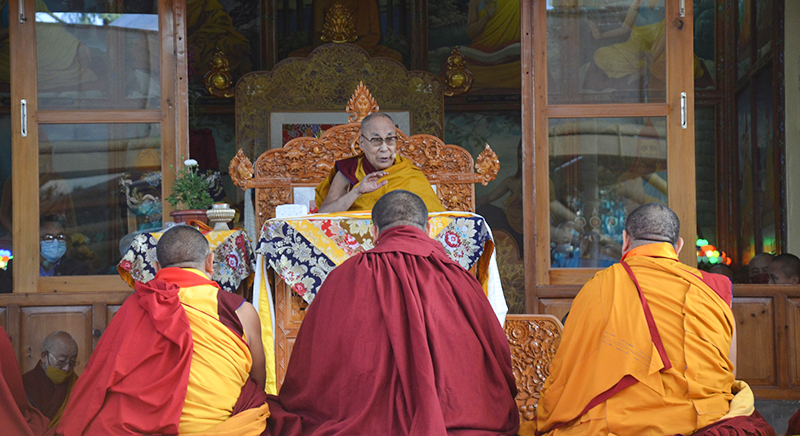Dharamshala – His Holiness the Dalai Lama gave a short teaching from the Jataka Tales followed by the Ceremony for Generating Bodhichitta in Dharamsala on Tuesday and he said,"What really transforms your mind is cultivating bodhichitta and the wisdom understanding emptiness. That’s why I meditate on them both as soon as I wake up every morning. This is the key to practice."
His Holiness the Dalai Lama gave a short teaching from the Jataka Tales followed by the Ceremony for Generating Bodhichitta at the Main Tibetan Temple (Tsuglagkhang) in Dharamsala, HP, India on March 7, 2023. Thousands of people from different countries gathered at Tsuglagkhang to listen his teaching and receive blessing of His Holiness the Dalai Lama.
His Holiness the Dalai Lama addressed the gathering and said that it had been customary to gather on this day during the Mönlam Chenmo, the Great Prayer Festival, in Lhasa, an event that has been celebrated for more than 600 years. Presently it’s difficult to hold the festival in the Land of Snow, but Tibetans in exile, inspired by the courage of the people in Tibet, have been able to keep the tradition alive. A key part of the proceedings on this fifteenth of the month, the first full-moon day of the year, is to read one of the Jataka Tales, the stories of the previous lives of the Buddha.
“In Tibet, thanks to Shantarakshita’s efforts, we maintained the authentic Nalanda Tradition. The important thing is to discipline your mind and control your emotions—to integrate what you study and learn with your mind," the Spiritual leader of Tibet said.
“We Tibetans may be refugees living in exile, but we have been able to preserve our traditions well.” His Holiness the Dalai Lama added.
“Today, we still have access to the Buddha’s teachings. We can apply them to ourselves and explain them to others. We rely not only on scriptural citation, but also on reason as Nagarjuna and his students have done. It’s only in the Tibetan tradition that we find this reliance on logic and reason. Such an approach used to be found in China and Mongolia too, but has since declined. May I contribute to reviving it so it may flourish in those places once more," His Holiness mentioned.
“Although we live in a degenerate era, we still have the opportunity to study, reflect and meditate on what the Buddha taught. We can acknowledge that all human beings want happiness and reflect that what brings about suffering is actually within us—ignorance and a self-cherishing attitude. If we remain selfish, suffering will not diminish," His Holiness added.
“Think about how all sentient beings are just like us. They don’t want to suffer; they just want to be happy. Here we are in a good place where we have encountered the teaching of the Buddha. We have the daily opportunity to cultivate the awakening mind of bodhichitta and an understanding of emptiness. How fortunate?," the Spiritual leader of Tibet said.
“Under such circumstances think to yourself, ‘How good it would be if all sentient beings were to overcome suffering and achieve happiness. I will help them to do just this. In this way generate a determination to liberate all sentient beings from suffering. Make a wish to bring them omniscience. Give rise to the wish to become a Buddha to liberate them all. Visualize this conventional bodhichitta transforming into a moon disc at your heart," he added.
“Then, if you ask why we suffer, you’ll discover it’s because things appear to us as if they have a solid, objective existence and we cling to this misconception in error. If you analyse things with the five-fold or seven-fold reasoning you’ll find you can’t pinpoint anything as this or that. The way things actually exist is in dependence, as merely designated. All phenomena are merely imputed by convention, labels, through language," His Holiness explained.
“The Buddha taught about emptiness of true existence on Vulture’s Peak. Think about how things have no solid, objective existence and visualize this understanding of their emptiness as a white vajra standing on the moon disc you’ve already imagined at your heart," His Holiness continues.
“Buddhahood is attained on the basis of these two principles—altruism and an understanding of emptiness. And it is from them that the Buddha’s form body and truth body arise," he added.
“What really transforms your mind is cultivating bodhichitta and the wisdom understanding emptiness. That’s why I meditate on them both as soon as I wake up every morning. This is the key to practice. Deity yoga is very good, but without the foundation of these two principles it’s not much use," His Holiness concluded.


![Tibet has a rich history as a sovereign nation until the 1950s when it was invaded by China. [Photo: File]](/images/stories/Pics-2024/March/Tibet-Nation-1940s.jpg#joomlaImage://local-images/stories/Pics-2024/March/Tibet-Nation-1940s.jpg?width=1489&height=878)
















